Amber Burgin-Brothers : Divinity in the Dirt
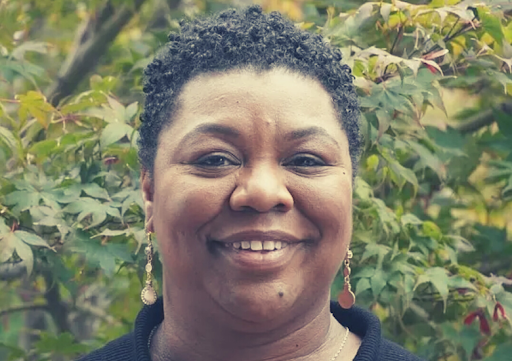
Written by: Rachel Dennis
Rev. Amber Burgin-Brothers has always had a connection with the land, and this connection has strengthened her relationship with God. The power of the Lord has led her to seek guidance and wellness with hands pressed deep in the dirt.
Through grace, grief, tears, anger, and gratitude, Rev. Burgin-Brothers has found a way towards a more authentic and empowered relationship with the creator as well as the faith-based community of Durham, North Carolina.
She is the creator of Elijah’s Farm, an agriculture project that grows plant-based resources while providing access and community education on food apartheid.
At Elijah’s Farm, there is an intersection between nutritional health, mental health, and spiritual health. Rev. Burgin-Brothers believes that these three areas are essential for a more holistic and just world.
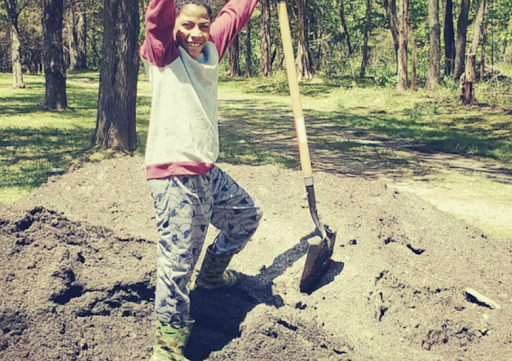
Elijah’s Farm, a 10-acre property in Durham, North Carolina, serves as a living ministry. The farm provides fresh and local foods as well as social opportunities for communities that are food insecure.
Rev. Burgin-Brothers decided to start the farm in 2019. At that time, she was looking for her place as a non-traditional pastor. Living as a single parent and well-educated Black woman for 11 years had, she felt, put her on the margins of what was acceptable in the Baptist community.
It was important to her to create a space in which she could pursue ministry and spiritual formation outside of the traditional church walls.
Rev. Burgin-Brothers recalls a meaningful moment when a mentor advised her to pick her path and take her intentions to the next level. No one else could take these steps for her, since the way had not been previously paved for someone like her.
This was a pivotal moment that allowed Rev. Burgin-Brothers to see herself as an agent of change in the world, no matter what opposition would come her way. The mentoring conversation eventually led to conversations with dispensaries and connections with local farmers of color. Rev. Burgin-Brothers saw and empathized with the many opportunities and limitations that these workers bore. She also noticed the lack of women of color in these agricultural spaces.
Rev. Burgin-Brothers realized that these conversations were steeped in social justice. Access to crop-growing techniques and fresh food dispersed into the local community was a matter of civil rights. There was an urgency to develop green spaces of activism. Through faith and self-determination, she was called to contribute.
Rev. Burgin-Brothers and her son Elijah broke ground and started sowing and seeding nine beds of crops. These were the first seedlings of what would become Elijah’s Farm.
Family members and friends contributed to the farm, and conversations about mental health and faith grew alongside the plants. Rev. Burgin-Brothers opened her farm to church organizations looking for safe outdoor gathering space for volunteering and reconnecting with the land.
Staying Steadfast On the Winding Road
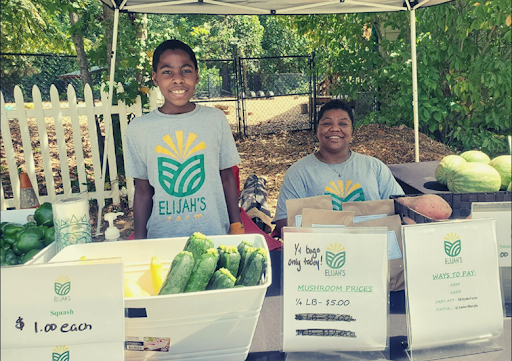
Rev. Burgin-Brothers’ initial objective on Elijah’s Farm was to work on the land for a year, receive a hemp license, and provide fair wages and jobs to previously incarcerated community members. However, the journey didn’t unfold as expected.
In addition to a delay in obtaining a hemp license, Rev. Burgin-Brothers endured the debilitating effects of a tick bite during the second season on the farm. This took her out of commission for an entire growing season. It made her slow down and reorient her vision of the land while communing with God on the next steps.
Even in a phase of rest, she never stopped taking small but mighty steps forward. Despite setbacks, Elijah’s Farm continued to flourish. They pivoted to cultivate gourmet mushrooms as their primary crop in the previous summer, and have now expanded their operations to 27 raised beds full of produce.
What is the secret to growth despite unforeseen setbacks? Rev. Burgin-Brothers credits God’s guidance as a source of strength and integrity.
“I have learned to trust God’s vision for my life and to allow God to help me find the right fit instead of trying to fit in where I think I’m supposed to be.”
Trust has allowed her to surrender to the grace of growing slowly. She teaches herself to enjoy the vision at large while allowing it to organically unfold. This is the grace of sustainability, which, in turn, slowly shifts the reality of her life, as well as the communities participating on the land.
Community Health and Mental Wellness as Ministry

In addition to Rev. Burgin-Brothers’ commitment to the development of Elijah’s Farm, she also nurtures her passion for community health advocacy.
She currently serves the youth of Durham as a support and resource manager at the Emily K Center, a non-profit that provides educational and career-related guidance to students who are otherwise underrepresented in professional development systems. Additionally, through serving as the young adult minister at Union Baptist Church, she has her finger on the pulse of the mental and emotional needs of youth and their families, in and out of the congregation.
She wears many hats in the mental health world and works to support people in areas as diverse as domestic abuse, anxiety, depression, and addiction.
“Sometimes my church looks like crisis management in the hospital. Sometimes it looks like figuring out how to pay someone’s rent. Sometimes it looks like having a real conversation with a parent saying ‘hey your kid’s pregnant and she’s not going to Yale’... Ministry opens my eyes every day… My purpose in ministry is not just relegated to one building, but many mansions.”
Her work in the mental health field has illuminated the relationship between access to nutritional foods and mental wellness. As Rev. Burgins-Brothers expands the farm’s offerings, she works to bridge the gap between local food production and mental health with community-based programming. She has also been actively conducting research preparing for an upcoming Ph.D. application.
Studying the concept of rumination illuminated for her the societal gap between access to resources (such as food) and the ability to process trauma. She reflects on how communities of color spend a tremendous amount of time in an anxious state of worry and stress.
Rev. Burgin-Brothers states that this isn’t a conscious decision for marginalized communities to spend time in a state of rumination. It is more so the result of systematic racism and classism that have oppressed these communities for generations.
She notes that the activists in this arena are all very tired, but that “curse-breaking” generations are trying to reverse the accessibility to resources that their ancestors lacked.
So how can one begin to address these systematic issues?
Rev. Burgin-Brothers’ work provides a starting point. By normalizing mental health conversations in her faith community and breaking the stigma of seeking therapeutic services in Black communities, she is slowly but surely changing the way underrepresented people process trauma.
The Future for Elijah’s Farm
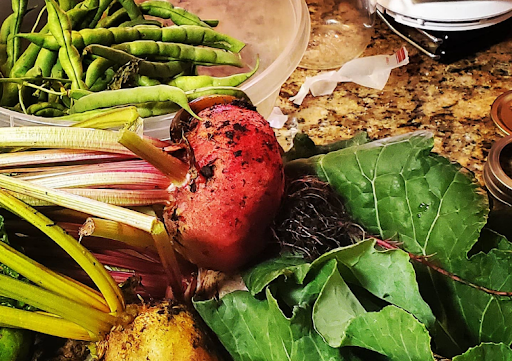
While the farm is still in its early years, Rev. Burgin-Brothers has big plans for growth. She envisions using it as a place of remediation, self-care, and collective liberation—starting with herself and her family, and then emanating out to her faith community and Durham area at large.
Personal boundaries and self-care will always come first for her:
“How do I create a life where my needs are primary and everything else around me functions when I feel well? That is not selfish. White people do this all the time and no one says anything about it until Black women speak up.”
Rev. Burgin-Brothers plans on partnering with the United Church of Christ to launch a CSA program and has a refrigerated trailer ready to be used as a mobile farmer’s market.
The budding food truck initiative helped Rev. Burgin-Brothers realize that her services were needed beyond the borders of Durham proper:
“I’m realizing that the community I thought I was going to be serving is all over the place. Because affordable housing in Durham is virtually non-existent. People are being pushed out of the community into other small towns where it’s difficult for them to get access to anything.”
With this in mind, she is working on programs that will share fresh produce outside of the city of Durham and put it into the hands of people who live in nearby food deserts.
Another ambitious project in the works at Elijah’s Farm is an initiative to become 100% solar, which will not only increase sustainability but will also serve as a model for other small businesses and farms.
These are all a part of Rev. Burgin-Brothers’ larger goal to make the farm a living center for education, and community-building. She ultimately hopes to cultivate a non-profit that can teach families and youth the “lost lessons”—embodying wisdom that has been passed down through generations of Black and Brown cultures.
Farming and Agriculture as Generational Wealth
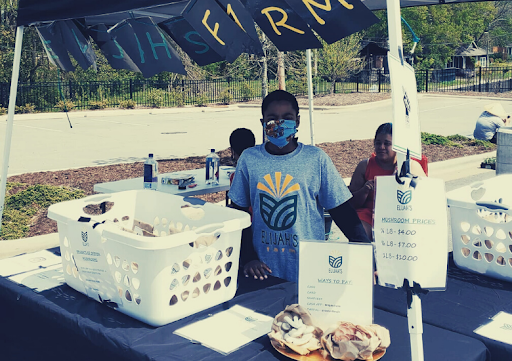
Rev. Burgin-Brothers always saw agriculture as a way of life. Her mother was raised on a farm and continued to grow her own food in her adult life. This gave her a unique perspective on the relationship between the land, food, and health.
As the child of two Black Panthers, she was always aware of the importance of service, and providing access to food was a powerful form of communal wealth. She remembers her mother as her preacher and pastor, having grown up outside of the congregation.
Her parents cast a critical eye on the actions of the church, questioning if the congregations were really supporting the well-being of the communities in need. This skepticism around organized religion was a formative experience, one that would eventually lead her to create her own faith-based initiatives.
“I did not have a theological background to lay a peg on. But I also think that that frees me. I don’t have a deep-steeped congregational experience of church that shadows or clouds my direct relationship with God…the church is not a building, and it never has been for me….so farming is the answer to that. It is my church and a reflection of God to me.”
The freedom to embrace the church outside of four walls has allowed her to create initiatives like Elijah’s Farm, as an authentic manifestation of her values. Generational wealth will continue to flow to her son as well her neighbors in the form of the farm—and this is Rev. Burgin-Brothers’ vision of what a healthy community looks like.
Lessons Learned from a Life of Service

Rev. Burgin-Brothers’ work is a shining example of how one can follow a call to service. It is a reminder that we all have something to offer this world, whatever the size of our platform.
She uses the farm to reflect on the power of a small act as a catalyst to change:
“It takes 87 days to grow a pepper plant. One plant isn’t going to solve all of the problems in the food system, but it’s a start.”
And this is what Rev. Burgin-Brothers does; get started. She creates momentum that allows others to access mental wellness, the study of divinity, and passion for the land. It is this combination of skills, experiences, and relationships that make her uniquely qualified as a leader towards a more just and equitable world.
If you’re ready to contribute to the cause, Rev. Bergin-Brothers has no shortage of suggestions of options for you to find your connection with the land, local communities, and God:
“Buy local food. Go to the farmer’s market. Find a BIPOC farmer. Buy from them directly, whether it’s a food box or being present at markets. When we think about giving, give gift certificates. Give food. Give healthy options. Because you’re able to give to the community in a better way when you actively choose to keep the dollar in the community. So you don’t give it away to the corporations that don’t care about us. Give your money to someone that you can see, talk to, feel, and touch. It changes the way you feel about yourself and your food.”
She believes that a shift in thinking about congregational care can include a larger and more honest conversation around food, access, and sovereignty. She states that creating equitable relationships in the church is the backbone of service to the faith community.
“Our relationship with creation is oftentimes rooted in this idea of authority instead of symbiotic relationship. I think that a shift in our minds about where we come from is very key in how we care about each other and ourselves. Adjust our mindset through action. Adjust the way we care for and tend to our communities.”
Rev. Burgin-Brothers’ final recommendation is to seek therapy.
“We think that mental health is separate from physical health and this isn’t true. Choosing to care for ourselves spiritually also includes caring for ourselves physically and also includes waking up in your right mind.”
Final Thoughts
When facing the challenges of starting a new initiative, especially in the midst of a pandemic and civil unrest, it would be easy to give in to despair. Rev. Amber Burgin-Brothers has found a way forward through difficulties, and has been blessed with God’s urging to find hope in the darkest moments.
Rev. Burgin-Brothers looks to the Green The Church community as an ally in the fight for food justice and community-building. As each individual contributes what they can to the movement, we take steps together toward a more just and equitable world.

If this story has inspired you, take action today and make your voice heard. Food justice is a critical part of the fight for racial equity. To learn more about how you can support BIPOC farmers, keep following Green The Church. And be sure to check out Rev. Burgin-Brothers’ work at Elijah’s Farm.

